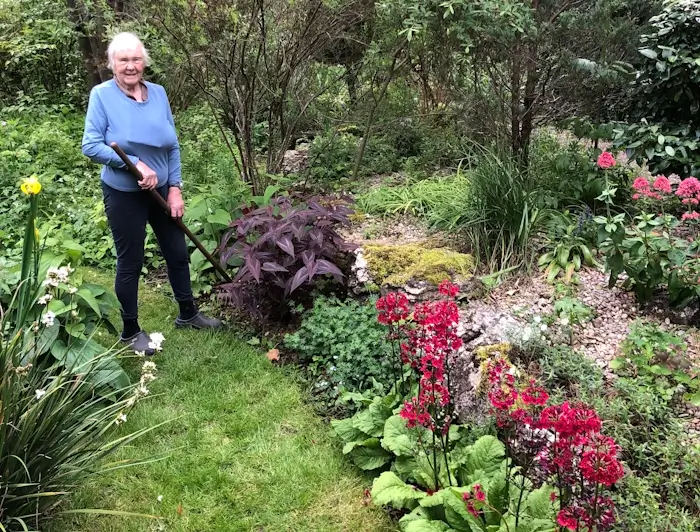In memory of Elizabeth's mother
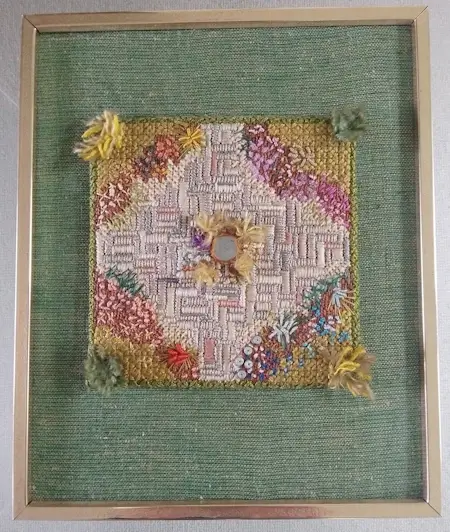
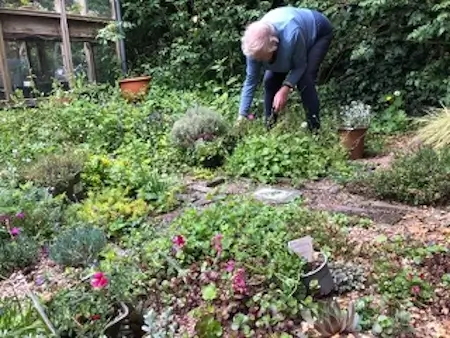
An embroidery done by her mother was the inspiration for one of the beds in Elizabeth's garden.
There are many highlights, but one is particularly personal. This is a square bed at the side of the house, modelled on the design of an embroidery her mother gave her many years ago: “I created it here, in her memory,” she smiles.
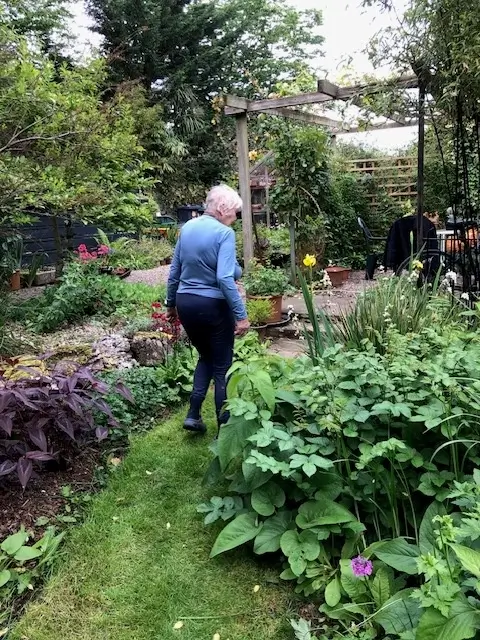 Born and raised in Scotland, Elizabeth’s interest in gardens and horticulture started in her childhood at her grandparents’ house in Perthshire: “a tremendously exciting place for a small child to explore.” Her mother was interested in the countryside and in wild flowers especially … a love and interest that also inspired Elizabeth, though she says that growing wild (ie native) plants in a cultivated space can be challenging as they self-seed so freely and can take over.
Born and raised in Scotland, Elizabeth’s interest in gardens and horticulture started in her childhood at her grandparents’ house in Perthshire: “a tremendously exciting place for a small child to explore.” Her mother was interested in the countryside and in wild flowers especially … a love and interest that also inspired Elizabeth, though she says that growing wild (ie native) plants in a cultivated space can be challenging as they self-seed so freely and can take over.
While her three children were growing up, their houses mostly had fairly small gardens, so they frequently went to parks, becoming familiar with all the plants there. “I have always been interested in public open spaces - how they are managed and how they grow things,” she says. “It’s been a common theme throughout my life.”
However, her early and mid-life career were very different. She did a degree in Chemistry at Edinburgh University and then worked at Cambridge University as a biochemistry research assistant.
Becoming bored with that life, she retrained with a postgraduate degree in social science at Northumbria University. This led to working for the Women’s Employment Federation (founded by Ray Strachey, a leading campaigner for women’s rights) in helping women find work outside the home and breaking through ‘glass ceilings.’ In the 80s she ran government/council funded projects to help unemployed people back to work.
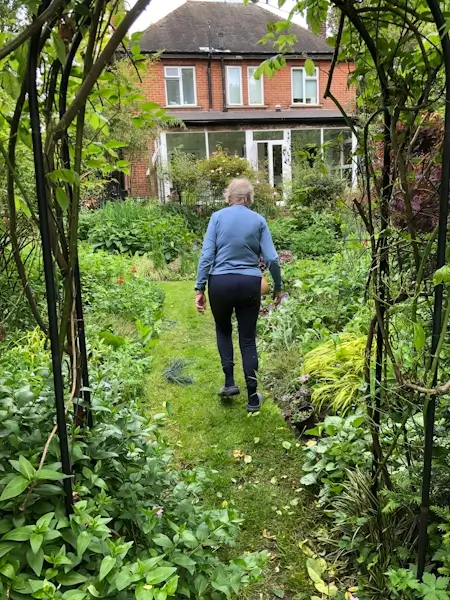 But she has always been interested in learning about horticulture. In the 1990s she had a cottage in the Scottish borders with a large garden and the neighbour was Ron McBeath, the retired curator of the Edinburgh Botanical Gardens. “I learned a lot from him … he had plant collections from the Himalayas,” she remembers fondly.
But she has always been interested in learning about horticulture. In the 1990s she had a cottage in the Scottish borders with a large garden and the neighbour was Ron McBeath, the retired curator of the Edinburgh Botanical Gardens. “I learned a lot from him … he had plant collections from the Himalayas,” she remembers fondly.
Reaching her late fifties, she decided to gain proper horticultural training, and the opportunity came when the family moved from Newcastle to London. She did a one-year RHS Introduction to Professional Gardening and was based in the Horticultural Yard at Regents Park. Then followed a 2nd year City & Guilds in Garden, based in Gunnersbury Park.
However, shortly after this she was diagnosed with macular degeneration (an incurable loss of central vision) which ended her aspirations of becoming a professional garden designer.
A result of this is that she became more involved with public spaces and gardens, and was recently presented with a Lifetime Achievement Award from Enfield Council for her contribution and work with the Friends of Broomfield Park.
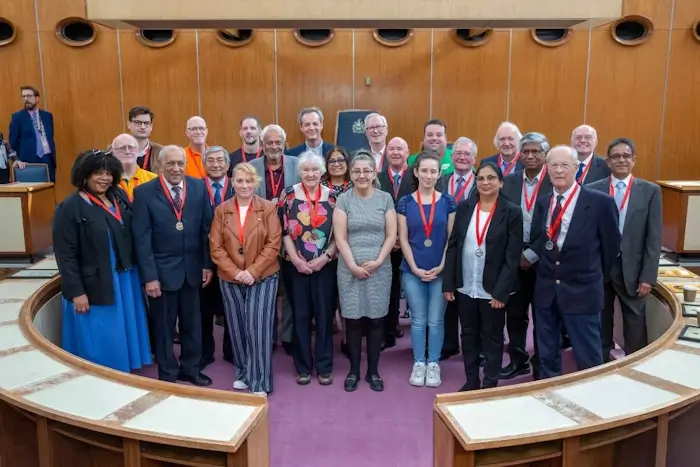 In April this year Elizabeth was the recipient of a Lifetime Achievement Award from Enfield Council. She's very easy to spot on this photo - she's front centre wearing a striking floral top (photo: Enfield Council)
In April this year Elizabeth was the recipient of a Lifetime Achievement Award from Enfield Council. She's very easy to spot on this photo - she's front centre wearing a striking floral top (photo: Enfield Council)
FoBP Chairman David March pays tribute to her “legendary passion, energy and determination”. He says, “She has been the powerhouse behind persuading the council to restore Broomfield Conservatory and leading volunteer teams caring both for the conservatory and transforming the historic walled garden and flower borders into the showpieces they are today.”
With the latest conservatory restoration just completed, Elizabeth’s Open Garden event is to raise money to help re-stock the plants lost due to lack of light and heat during the works.
Today her sight is very limited but, with her usual positive attitude, she says “I cope mostly by ignoring it,” she says. “My motto is to just get on and do things!”
She admits that gardening is “getting a bit tricky”. She can’t read plant labels and it’s more difficult to distinguish between a weed and a plant – which was never the case in the past as she says “In my younger days when we drove regularly from London to Scotland I could identify all the plants we were going past at 60 mph!”
What she loves about gardens – private and public – is that they can be peaceful and restorative places for mind and body. “There is a calming / meditative quality in gardening with hand tools, working with your hands in and with nature. Nothing can beat that.”
So if Elizabeth could be a plant what would she be? She laughs … ‘Well, my favourites are mountain alpines, but I am not shy and retiring. I am enthusiastic and hard-working so I would be a plant that is keen to grow.” She finally decides on a hardy geranium … because there are lots of varieties and they grow well anywhere.
Photos: Victoria Black

Elizabeth Dobbie will be opening her garden to the public between 2 and 4.30pm on Sunday 16th June. Admission will be £3. As well as a chance to see her beautiful garden, there will be a plant, teas and cakes on sale and all money raised will go towards restocking the plants in Broomfield Conservatory to replace those that didn't make it through the extended closure for repairs and redecoration.
